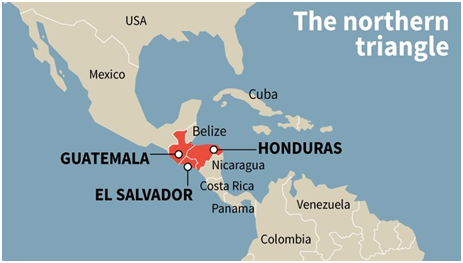El Salvador Adopts Bitcoin as Legal Tender | 11 Jun 2021
Why in News
El Salvador, a small coastal country in Central America has become the first in the world to adopt Bitcoin, as legal tender.
- Legal tender is the legally recognized money within a given political jurisdiction.
Key Points
- Bitcoin:
- Introduction:
- Introduced in 2009, it is a type of cryptocurrency that enables instant payments to anyone.
- Cryptocurrency is a specific type of virtual currency, which is decentralised and protected by cryptographic encryption techniques.
- Bitcoin, Ethereum, Ripple are a few notable examples of cryptocurrencies.
- Bitcoin is based on an open-source protocol and is not issued by any central authority.
- Introduced in 2009, it is a type of cryptocurrency that enables instant payments to anyone.
- Use:
- Originally, Bitcoin was intended to provide an alternative to fiat money and become a universally accepted medium of exchange directly between two involved parties.
- Fiat money is a government-issued currency that is not backed by a commodity such as gold.
- Originally, Bitcoin was intended to provide an alternative to fiat money and become a universally accepted medium of exchange directly between two involved parties.
- Introduction:
- Reason behind this Decision:
- Loss on Remittances:
- El Salvador relies heavily on money sent back from workers abroad.
- Bitcoin adoption may make these remittances quicker and cheaper.
- Boost Financial Inclusion:
- It is also expected to boost financial inclusion in their country as the majority of the population does not have access to formal banking channels.
- Loss on Remittances:
- Concerns:
- In the absence of a central regulating authority, legalizing bitcoin will have potential for fraud and money laundering, high energy costs and extreme volatility.
- Implications for the Crypto World:
- This could potentially encourage other smaller countries with weaker economies to open up to crypto as an alternative to fiat currencies, paving the way for mainstream future adoption worldwide.
- Already, Venezuela and many African countries have started using cryptocurrencies as a long term store of value, as their currencies are deflating quickly.
- Some Lessons for India:
- Not a Instance for Monetary Policy:
- El Salvador does not have its own monetary policy, hence, no local currency to protect. It runs on the monetary policy of the US Federal Reserve.
- Therefore, any changes in Federal Reserve policies will definitely affect the Country. Hence, it is looking at such alternatives.
- Since, India has its own currency and a central bank, therefore coexistence of bitcoin and rupee side by side becomes difficult.
- El Salvador does not have its own monetary policy, hence, no local currency to protect. It runs on the monetary policy of the US Federal Reserve.
- Impact on Remittances:
- The impact Bitcoin has on remittance inflows would be worth monitoring for India, which is home to the largest remittance market in the world.
- According to a World Bank report, India received over USD 83 billion in remittances in 2020.
- The impact Bitcoin has on remittance inflows would be worth monitoring for India, which is home to the largest remittance market in the world.
- Impact on Money Laundering:
- The implication of this move for money laundering is unclear at the moment.
- Currently, El Salvador is not considered deficient under the Financial Action Task Force (FATF) money laundering requirements.
- However, with large scale cryptocurrency inflows and outflows, it would be expected that El Salvador would comply with the 2019 FATF guidance on Virtual Currencies.
- Not a Instance for Monetary Policy:
- India’s Current Stand on Cryptocurrency:
- In 2018, The Reserve Bank of India (RBI) issued a circular preventing all banks from dealing in cryptocurrencies. This circular was declared unconstitutional by the Supreme Court in May 2020.
- Recently, the government has announced to introduce a bill; Cryptocurrency and Regulation of Official Digital Currency Bill, 2021, to create a sovereign digital currency and simultaneously ban all private cryptocurrencies.
- In India, the funds that have gone into the Indian blockchain start-ups account for less than 0.2% of the amount raised by the sector globally.
- The current approach towards cryptocurrencies makes it near-impossible for blockchain entrepreneurs and investors to acquire much economic benefit.
Way Forward
- The overall takeaway for India from the El Salvador case is not in the monetary sense at all but as an example of how far countries are willing to go to attract what they believe is the ultimate prize – innovators and entrepreneurs working on this emerging sector.
- This is the wealth that India has definitely and has barely protected with policy.
- While deliberations continue in India on the monetary and financial regulations around cryptocurrency, it is important that attention be paid to incentives for India’s developers working on key innovations in the space.

